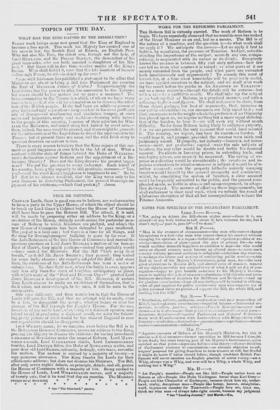WORK FOR THE REFORMED PARLIAMENT.
THE Reform Bill is virtually carried. The work of Reform is to begin. We have repeatedly observed that no sensible man has looked at theGreat Measure as an end, but as a means. The Bill is of the nature of a machine, and the question is—to what work shall we apply it ? We anticipate the answer—Let us apply it first to lighten, by equalizing, the pressure of Taxation. And yet, notwith. standing the importance of the subject, scarcely any one, compa- ratively, is acquainted with its nature or its details. Everybody knows the revenue is between fifty and sixty millions—how few can tell us from what sources it is raised ; or what parts of it are merely extracted froth the people, and what 'part s are extraeted both mischievously and oppressively ! To remedy this want of knowledge, at a time when knowledge will be practically useful, We have applied ourselves to the subject, and we shall next week lay flue result before the public in AN ANATOMY OF TAxAtioDr : not as a mere curiosity—though the details will be curious—but. with a view to a profitable result. We shall take up the subject a,: lee took up that of Reform, in a practical manner, and with a reference, tofhrts and figures. We shall endeavour to show, from those driest, perhaps, but best of arguments, that, immense as our public expenditure is, our resources are fully equal to it ; and that, enormous as is the weight which the profusion of an Oligarchy has placed upon us, we require nothing but a more equal distribu- tion of the burden, to bear it—we will even say without much difficulty. So far from Reform being likely to endanger property, it is, we are persuaded, the only measure that could have secured it. The country, we repeat, can bear its enormous burden. It would bear it, and prosper, provided the revenue were fairly and judiciously raised. If property, not industry—luxuries, not neces- saries—inert, not productive capital—were the sole subjects of taxation, the real relief would be double and treble tl:e nominal amount. Ifs etfects.in lowering prices, in extending trade, and employing labour, can scarcely be measured. The saving of ex- pense in collecting would be considerable ; the vexatious and in- jurious restrictions to which commerce is subjected would be alto- gether removed ; even the property hitherto unfairly escaping taxation would benelit by the general prosperity and confidence; whilst, by simplifying the system of taxation, a clear account could he frequently submitted to the public, and the present com- plicated mode, so fertile in abuses and mismanagement, he altoge- ther destroyed.. The manner of effecting these improvements, we shall endeavour to show next Week, when we submit the result of a laborious dissection of that all but. incomprehensible volume the Finance Accounts.


























 Previous page
Previous page